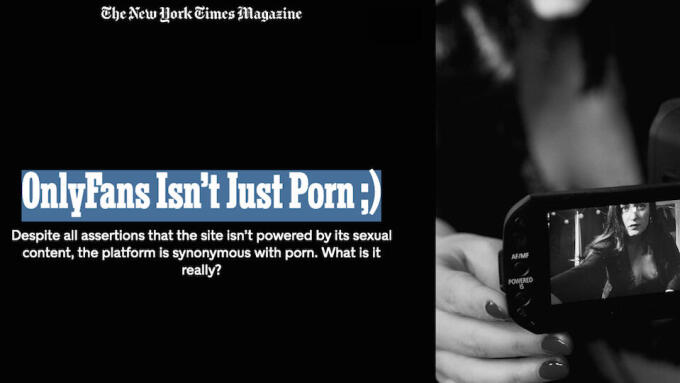NEW YORK — The New York Times Magazine — an editorially independent section of the New York Times — published today a mainstream-facing, comprehensive look at the OnlyFans phenomenon, penned by celebrated writer, editor and sex worker Charlotte Shane.
The article, titled “OnlyFans Isn’t Just Porn ;),” surveyed a number of aspects of the culturally significant discourses around the name-brand premium fan platform, including its reliance on and uneasiness about sex workers, its role during the pandemic, its place in the ongoing War on Porn and other issues.
Shane is an East Coast-based author of the memoiristic series of essays “Prostitute Laundry,” based on a blog revered by many sex workers as one of the most honest accounts of life in New York's commercial sex industry in the 2000s.
She used a combination of anecdotal evidence, interviews, journalistic reporting and cultural analysis to achieve one of the most astute descriptions of the OnlyFans phenomenon.
Shane’s piece did not dismiss the opinions of sex workers and advocacy groups about issues that concern them — an unusual angle for a New York Times product — and was unequivocally critical in its assessment of FOSTA-SESTA and the current campaigns to defund adult-oriented websites waged by religiously inspired groups.
Shane placed the rise of OnlyFans in the last year as “a result of creators’ savvy maneuvering and a convergence of circumstances: a global plague, a consumer base accustomed to making spontaneous micropayments (think a $5 donation on a friend’s GoFundMe page or $2.99 episodes of streaming TV shows) and, perhaps most important, a denuded marketplace.”
“OnlyFans was perfectly positioned to become a housebound population’s go-to source for explicit material because of what is called the gentrification of the internet,” Shane wrote. “In the context of sex work, this refers to an aggressive pattern of policing both the sex trade and the people who work in it.”
“In the United States, this regulatory campaign can be traced back to the federal government’s protracted and ultimately successful crusade against Craigslist’s 'Erotic Services' in the early 2010s,” Shane explained.
Her assessment represents a striking 180-degree turn from the Times' own editorial endorsement of legislation that would criminalize sex work.
“Since then, the F.B.I. and federal prosecutors have systematically targeted a slew of sites that cater to sex workers, particularly advertising platforms like Backpage, which shuttered in 2018 after a multiyear effort by California’s attorney general at the time, Kamala Harris. In April that year, the bills known collectively as FOSTA-SESTA, which further criminalize communication around commercial sex, were signed into law by Donald Trump," noted Shane.
"Prevention of sex trafficking and protection of minors are the most frequent justifications for these laws and prosecutions, but activists reject the claim that these measures help anyone, minors and trafficking victims included," the author said. "There is evidence to support their arguments. In 2019, for instance, a study conducted by researchers at Baylor and Claremont Graduate Universities found that Craigslist’s affordable ads let workers move indoors and screen clients more effectively, which helped reduce female-victim homicides by 10 to 17 percent."
To read the article, visit the New York Times Magazine.
For more from Charlotte Shane, follow her on Twitter.




